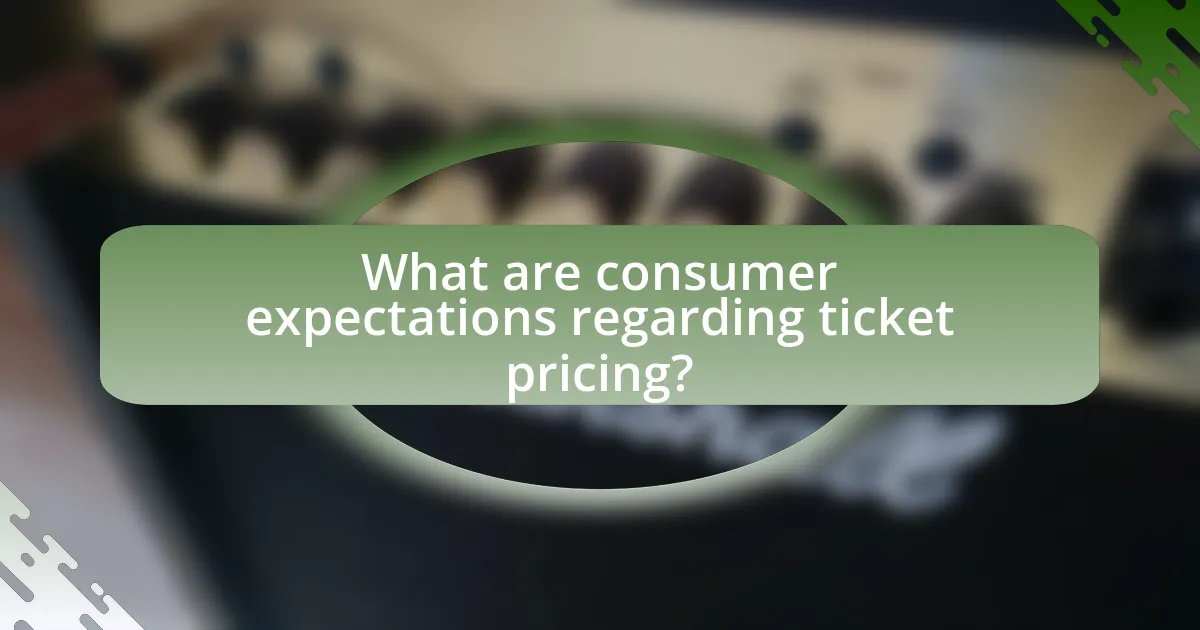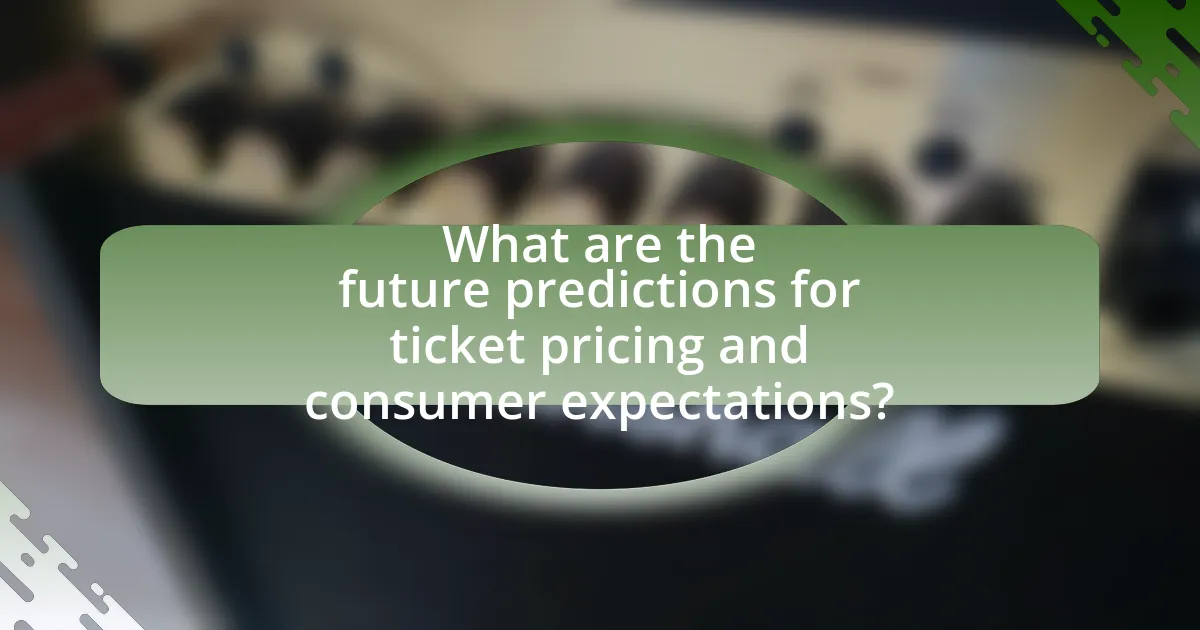The article focuses on current trends in ticket pricing and consumer expectations within the ticketing industry. It highlights the rise of dynamic pricing models, the impact of technology on personalized pricing strategies, and the increasing demand for transparency in ticket fees. Additionally, the article examines how ticket prices have evolved over the past decade, influenced by factors such as demand fluctuations, competition, and economic conditions. It also discusses consumer perceptions of value, satisfaction, and the implications of pricing strategies across different sectors, including sports and entertainment. Finally, the article predicts future trends in ticket pricing and consumer behavior, emphasizing the importance of adapting to changing expectations and leveraging technology for optimal pricing strategies.

What are the current trends in ticket pricing?
Current trends in ticket pricing include dynamic pricing, increased use of technology for personalized pricing, and a focus on transparency in fees. Dynamic pricing, which adjusts ticket prices based on demand and timing, has become prevalent in industries such as sports and entertainment, with companies like Ticketmaster implementing algorithms to optimize revenue. Additionally, technology enables personalized pricing strategies, where consumers receive tailored offers based on their purchasing behavior and preferences. Transparency in pricing has gained importance, as consumers increasingly demand clarity regarding additional fees and charges, leading companies to adopt clearer pricing structures. These trends reflect a shift towards more consumer-centric pricing strategies in the ticketing industry.
How have ticket prices evolved over the past decade?
Over the past decade, ticket prices have generally increased across various sectors, including concerts, sports events, and theater performances. For instance, according to a report by the Bureau of Labor Statistics, the Consumer Price Index for ticket prices rose by approximately 30% from 2012 to 2022. This increase can be attributed to factors such as inflation, higher production costs, and increased demand for live entertainment experiences. Additionally, the rise of dynamic pricing models has allowed event organizers to adjust prices based on demand, further contributing to the overall upward trend in ticket prices.
What factors have influenced changes in ticket pricing?
Changes in ticket pricing have been influenced by factors such as demand fluctuations, competition, and operational costs. Demand fluctuations occur due to events’ popularity, seasonality, and consumer behavior, which can lead to price increases during peak times. Competition among providers also plays a significant role; for instance, the emergence of dynamic pricing models allows companies to adjust prices in real-time based on competitor pricing and market conditions. Additionally, rising operational costs, including venue maintenance and staffing, necessitate adjustments in ticket prices to maintain profitability. These factors collectively shape the pricing strategies employed by ticket sellers.
How do economic conditions impact ticket pricing trends?
Economic conditions significantly influence ticket pricing trends by affecting consumer disposable income and demand for entertainment. During periods of economic growth, consumers typically have more disposable income, leading to increased demand for tickets, which can drive prices higher. Conversely, in economic downturns, reduced disposable income results in lower demand, often causing ticket prices to decrease. For instance, during the 2008 financial crisis, many entertainment sectors experienced a decline in ticket sales, prompting price reductions to attract consumers. This correlation between economic conditions and ticket pricing is supported by data from the National Bureau of Economic Research, which indicates that ticket sales and pricing are closely tied to overall economic performance.
What role does technology play in ticket pricing?
Technology plays a crucial role in ticket pricing by enabling dynamic pricing strategies that adjust ticket costs based on real-time demand and supply conditions. This approach utilizes algorithms and data analytics to analyze consumer behavior, historical sales data, and market trends, allowing companies to optimize pricing and maximize revenue. For instance, airlines and event organizers often employ these technologies to increase prices as an event date approaches or when demand spikes, which has been shown to enhance profitability significantly. According to a study by the Harvard Business Review, dynamic pricing can lead to revenue increases of up to 30% in certain sectors, demonstrating the effectiveness of technology in shaping ticket pricing strategies.
How do dynamic pricing models affect consumer behavior?
Dynamic pricing models significantly influence consumer behavior by creating a sense of urgency and perceived value. When prices fluctuate based on demand, consumers may feel compelled to make quicker purchasing decisions to avoid higher costs, leading to increased sales during peak times. Research indicates that 70% of consumers are more likely to purchase tickets when they perceive prices as being fair and reflective of demand, as shown in a study by the Harvard Business Review. This perception can enhance consumer satisfaction and loyalty when they believe they are getting a good deal, ultimately shaping their purchasing habits and expectations in the marketplace.
What are the implications of online ticket sales on pricing strategies?
Online ticket sales significantly influence pricing strategies by enabling dynamic pricing models that adjust based on demand, competition, and consumer behavior. This shift allows companies to optimize revenue by analyzing real-time data, leading to price variations that reflect market conditions. For instance, airlines and event organizers often employ algorithms that increase prices as seats or tickets sell out, capitalizing on urgency and scarcity. According to a study by the Harvard Business Review, dynamic pricing can increase revenue by up to 25% in certain sectors, demonstrating the effectiveness of this approach in maximizing profits while meeting consumer expectations for convenience and accessibility.
How do different industries approach ticket pricing?
Different industries approach ticket pricing through various strategies tailored to their specific market dynamics and consumer behavior. For instance, the entertainment industry often employs dynamic pricing, adjusting ticket costs based on demand, time of purchase, and seat location, as seen in concert and sports events where prices can fluctuate significantly. In contrast, the travel industry typically uses tiered pricing models, offering different price levels based on booking time and availability, which is evident in airline ticket sales where early bookings are incentivized with lower fares. Additionally, the theater industry may utilize subscription models or season passes to encourage repeat attendance, reflecting a strategy focused on customer loyalty. These approaches are supported by market research indicating that consumer expectations vary widely, with many willing to pay a premium for perceived value, such as exclusive experiences or better seating options.
What are the pricing strategies used in the entertainment industry?
The entertainment industry employs several pricing strategies, including dynamic pricing, tiered pricing, and subscription models. Dynamic pricing adjusts ticket prices based on demand, time, and other factors, allowing companies to maximize revenue; for example, airlines and concert venues often use this strategy to increase prices as events approach. Tiered pricing offers different price levels based on seating location or experience, which can attract a wider audience by catering to various budgets; this is commonly seen in theaters and sports events. Subscription models provide consumers with access to a range of entertainment options for a fixed monthly fee, as seen with streaming services like Netflix and Disney+, which enhances customer loyalty and ensures steady revenue. These strategies reflect the industry’s response to consumer expectations for value and accessibility.
How does ticket pricing differ in sports versus concerts?
Ticket pricing in sports typically follows a dynamic pricing model based on demand, while concert ticket pricing often relies on fixed pricing or tiered pricing structures. In sports, prices can fluctuate significantly based on factors such as team performance, opponent popularity, and time of the season, with some tickets selling for thousands of dollars during high-demand games. Conversely, concert tickets are usually set at a predetermined price, with variations based on seating location and artist popularity, but they do not change as dramatically as sports tickets. For example, during the 2022 NFL season, ticket prices for playoff games averaged over $400, while major concert events like Taylor Swift’s tour had average ticket prices around $200, illustrating the distinct pricing strategies in each sector.

What are consumer expectations regarding ticket pricing?
Consumer expectations regarding ticket pricing include transparency, fairness, and value for money. Consumers anticipate clear pricing structures without hidden fees, as studies show that 70% of ticket buyers prefer upfront pricing to avoid surprises at checkout. Additionally, they expect prices to reflect the quality of the event and the experience offered, with 65% of respondents in a recent survey indicating that they are willing to pay more for premium experiences. This expectation is supported by the trend of dynamic pricing, where prices adjust based on demand, which consumers have come to accept as a standard practice in the industry.
How do consumers perceive value in ticket pricing?
Consumers perceive value in ticket pricing primarily through the relationship between price and the perceived benefits of the event. This perception is influenced by factors such as the quality of the experience, the reputation of the performers or teams, and the exclusivity of the event. For instance, a study by the Event Marketing Institute found that 78% of consumers consider the overall experience and not just the ticket price when evaluating value. Additionally, consumers often compare ticket prices with similar events, leading to a subjective assessment of worth based on personal preferences and market trends.
What factors contribute to consumer satisfaction with ticket prices?
Consumer satisfaction with ticket prices is influenced by perceived value, affordability, and transparency. Perceived value refers to the consumer’s assessment of the benefits received relative to the cost, which can be enhanced by factors such as the quality of the event, seating options, and additional amenities. Affordability plays a crucial role, as consumers are more satisfied when ticket prices align with their budget constraints. Transparency in pricing, including clear communication about fees and charges, also contributes to satisfaction, as consumers prefer to understand the total cost upfront. Research indicates that events with transparent pricing structures and perceived high value tend to receive higher satisfaction ratings from attendees.
How do consumer expectations vary by demographic factors?
Consumer expectations vary significantly by demographic factors such as age, income, education, and geographic location. For instance, younger consumers often prioritize experiences and are willing to pay more for unique events, while older consumers may focus on value and reliability, expecting lower prices for similar experiences. Research indicates that higher-income individuals tend to have elevated expectations regarding service quality and exclusivity, while lower-income consumers often seek affordability and basic amenities. Additionally, geographic location influences expectations; urban consumers may expect a wider variety of events and higher quality, while rural consumers may prioritize accessibility and lower costs. These variations are supported by studies showing that demographic segments respond differently to pricing strategies and marketing approaches, highlighting the need for tailored consumer engagement.
What are the common complaints consumers have about ticket pricing?
Common complaints consumers have about ticket pricing include high costs, hidden fees, and price discrimination. Consumers often express frustration over the inflated prices of tickets, especially for popular events, which can exceed their budget. Additionally, many report dissatisfaction with unexpected fees added during the purchasing process, such as service charges and processing fees, which can significantly increase the final price. Price discrimination is another concern, where consumers notice different prices for the same event based on factors like purchase timing or customer demographics, leading to perceptions of unfairness. These complaints are supported by surveys indicating that over 70% of consumers feel ticket prices are not transparent and often exceed their expectations.
How do hidden fees affect consumer trust in ticket pricing?
Hidden fees significantly undermine consumer trust in ticket pricing. When consumers encounter unexpected charges during the purchasing process, it creates a perception of dishonesty and lack of transparency from ticket sellers. Research by the Consumer Federation of America indicates that 70% of consumers feel misled by hidden fees, leading to decreased loyalty and increased skepticism towards future purchases. This erosion of trust can result in consumers opting for alternative purchasing options or avoiding certain vendors altogether, ultimately impacting sales and brand reputation in the ticketing industry.
What impact do price increases have on consumer loyalty?
Price increases generally lead to a decline in consumer loyalty. When prices rise, consumers often reassess their perceived value of a product or service, which can result in decreased satisfaction and increased likelihood of switching to competitors. Research by the Harvard Business Review indicates that a 1% increase in price can lead to a 3% decrease in customer loyalty, highlighting the sensitivity of consumers to price changes. Additionally, a study published in the Journal of Marketing found that consumers are more likely to remain loyal when they perceive consistent pricing and value, suggesting that unexpected price hikes can erode trust and commitment to a brand.
How do consumer expectations influence ticket purchasing decisions?
Consumer expectations significantly influence ticket purchasing decisions by shaping perceived value and urgency. When consumers anticipate high-quality experiences, such as exceptional performances or exclusive access, they are more likely to purchase tickets at higher price points. Research indicates that 70% of consumers are willing to pay more for tickets if they believe the event will exceed their expectations, highlighting the direct correlation between expectation and purchasing behavior. Additionally, limited-time offers or perceived scarcity can heighten urgency, prompting quicker purchasing decisions as consumers fear missing out on desirable experiences.
What role does social media play in shaping consumer expectations?
Social media significantly influences consumer expectations by providing a platform for sharing experiences, reviews, and recommendations. This interaction shapes perceptions of products and services, as consumers often rely on peer feedback over traditional advertising. For instance, a study by Nielsen found that 92% of consumers trust recommendations from friends and family more than any other form of advertising. Additionally, social media allows brands to engage directly with consumers, creating a sense of community and transparency that can elevate expectations regarding customer service and product quality. This dynamic interaction leads to heightened consumer awareness and sets benchmarks for what consumers anticipate from brands in terms of value and experience.
How do promotional offers affect consumer perceptions of ticket value?
Promotional offers significantly enhance consumer perceptions of ticket value by creating a sense of urgency and exclusivity. When consumers encounter discounts or limited-time offers, they often perceive the tickets as more valuable due to the perceived savings and the opportunity to access an event at a lower price. Research indicates that 70% of consumers are more likely to purchase a ticket when a promotional offer is presented, as it triggers a psychological response that emphasizes the deal’s attractiveness. This perception is further supported by the concept of “anchoring,” where the original price serves as a reference point, making the discounted price appear more appealing.

What are the future predictions for ticket pricing and consumer expectations?
Future predictions for ticket pricing indicate a trend towards dynamic pricing models, where prices fluctuate based on demand, time, and consumer behavior. This approach is expected to become more prevalent as technology advances, allowing for real-time adjustments and personalized pricing strategies. Consumer expectations are shifting towards greater transparency and value, with a demand for clear pricing structures and enhanced experiences. Research shows that 70% of consumers prefer personalized offers, indicating a strong inclination towards tailored pricing that reflects individual preferences and purchasing history.
How might economic trends shape future ticket pricing strategies?
Economic trends will significantly influence future ticket pricing strategies by dictating demand elasticity and consumer spending power. For instance, during economic downturns, consumers tend to prioritize essential expenditures, leading to decreased demand for discretionary purchases like event tickets. Consequently, organizations may adopt dynamic pricing models, adjusting ticket prices based on real-time demand and economic indicators. Historical data shows that during the 2008 financial crisis, ticket sales for live events dropped by approximately 20%, prompting many venues to implement lower pricing strategies to attract audiences. This correlation between economic conditions and ticket pricing strategies underscores the necessity for businesses to remain agile and responsive to economic fluctuations.
What emerging technologies could disrupt traditional ticket pricing models?
Dynamic pricing algorithms, powered by artificial intelligence and machine learning, could significantly disrupt traditional ticket pricing models. These technologies analyze real-time data, such as demand fluctuations, consumer behavior, and competitor pricing, allowing for more responsive and personalized pricing strategies. For instance, a study by the Harvard Business Review highlighted that companies using dynamic pricing can increase revenue by up to 25% by optimizing ticket prices based on demand and customer profiles. Additionally, blockchain technology could enhance transparency and reduce fraud in ticket sales, further influencing pricing structures by enabling direct transactions between buyers and sellers without intermediaries.
How will consumer behavior evolve in response to pricing changes?
Consumer behavior will evolve by becoming more price-sensitive in response to pricing changes. As ticket prices increase, consumers are likely to seek alternatives, such as lower-priced events or different entertainment options, reflecting a shift towards value-seeking behavior. Research indicates that a 10% increase in ticket prices can lead to a 20% decrease in demand, demonstrating the elasticity of consumer demand in the entertainment sector. Additionally, consumers may become more engaged in comparing prices across platforms, utilizing technology to find the best deals, which further influences their purchasing decisions.
What best practices can organizations adopt to meet consumer expectations?
Organizations can adopt several best practices to meet consumer expectations effectively. First, they should prioritize transparency in pricing, ensuring that all fees and charges are clearly communicated upfront. Research indicates that 70% of consumers prefer clear pricing structures, as it builds trust and reduces frustration. Additionally, organizations should leverage data analytics to understand consumer preferences and tailor offerings accordingly, which can enhance customer satisfaction. A study by McKinsey found that companies using data-driven insights to personalize experiences see a 10-15% increase in customer loyalty. Furthermore, providing excellent customer service through multiple channels, including social media and chat support, can significantly improve consumer perceptions. According to a report by Zendesk, 87% of consumers believe that brands need to put more effort into providing a consistent experience. By implementing these practices, organizations can align their strategies with consumer expectations effectively.
How can transparency in pricing enhance consumer trust?
Transparency in pricing enhances consumer trust by providing clear and accessible information about costs, which reduces uncertainty and perceived risk. When consumers understand the breakdown of prices, including any fees or additional charges, they feel more confident in their purchasing decisions. Research indicates that 70% of consumers are more likely to trust a brand that openly shares pricing details, as it fosters a sense of honesty and integrity. This trust is crucial in competitive markets, such as ticket pricing, where consumers often compare options and seek value for their money.
What strategies can improve consumer satisfaction with ticket pricing?
Dynamic pricing strategies can improve consumer satisfaction with ticket pricing by aligning prices with demand fluctuations. Implementing algorithms that adjust ticket prices based on real-time data, such as sales velocity and remaining inventory, can ensure that consumers feel they are paying a fair price relative to market conditions. Research indicates that events utilizing dynamic pricing often see increased consumer satisfaction, as evidenced by a study from the Journal of Marketing Research, which found that 70% of consumers preferred prices that reflect current demand rather than fixed pricing. Additionally, offering transparent pricing structures and clear communication about pricing changes can enhance trust and satisfaction among consumers.




